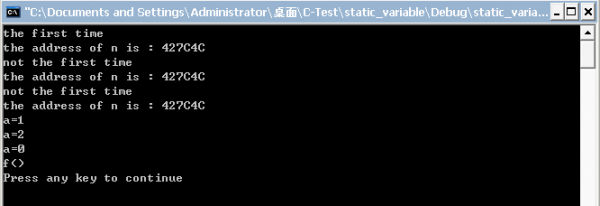C语言中的static
来源:程序员人生 发布时间:2015-06-15 08:03:22 阅读次数:2608次
原理
C语言中的static可用来改变变量的作用域和生存期和函数的作用域,该关键字可以用来修饰函数的定义和声明,和变量的定义。
用static修饰函数定义,表示该函数只在本文件有效(定义所在的文件),其它文件对该函数不可见。
用static修饰函数外的变量定义,表示该变量只在本文件有效(定义所在的文件),其它文件对该变量不可见。
用static修饰函数内的变量定义,表示该变量在屡次函数调用间1直有效。它的作用域依然是函数,但生存期是全部程序的生存期
用static修饰函数声明,表示该函数的定义只能在本文件
about声明和定义
如果定义先于使用,则不需要声明
当定义后于使用时,在使用之前声明
小实验
file1.cpp
#include<stdio.h>
//static variable,used only in a file
static int a;
//static function,used only in a file
static void f(void ){
a=1;
printf("a=%d
",a);
a=2;
printf("a=%d
",a);
}
void ff(void){
f();
}
main.cpp
#include<stdio.h>
//in "f1.cpp", define a and f as static
int a;
void f(void){
printf("f()
");
}
void ff(void);
extern void print(void);
/***************************主函数***************************/
int main(){
print();
print();
print();
ff();
printf("a=%d
",a);
f();
return 0;
}
void print(void){
static int n=0;
if(n==0)
{
printf("the first time
");
n=1;
}
else
{
printf("not the first time
");
}
printf("the address of n is : %X
",&n);
}
实验结果

生活不易,码农辛苦
如果您觉得本网站对您的学习有所帮助,可以手机扫描二维码进行捐赠


